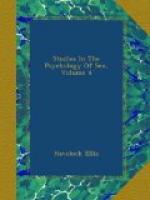There can be no doubt that among a very large number of animals of most various classes, more especially among insects and birds, the attraction of music is supported and developed on the basis of sexual attraction, the musical notes emitted serving as a sexual lure to the other sex. The evidence on this point was carefully investigated by Darwin on a very wide basis.[110] It has been questioned, some writers preferring to adopt the view of Herbert Spencer,[111] that the singing of birds is due to “overflow of energy,” the relation between courtship and singing being merely “a relation of concomitance.” This view is no longer tenable; whatever the precise origin of the musical notes of animals may be,—and it is not necessary to suppose that sexual attraction had a large part in their first rudimentary beginnings,—there can now be little doubt that musical sounds, and, among birds, singing, play a very large part indeed in bringing the male and the female together.[112] Usually, it would appear, it is the performance of the male that attracts the female; it is only among very simple and primitive musicians, like some insects, that the female thus attracts the male.[113] The fact that it is nearly always one sex only that is thus musically gifted should alone have sufficed to throw suspicion on any but a sexual solution of this problem of animal song.
It is, however, an exceedingly remarkable fact that, although among insects and lower vertebrates the sexual influence of music is so large, and although among mammals and predominantly in man the emotional and aesthetic influence of music is so great, yet neither in man nor any of the higher mammals has music been found to exert a predominant sexual influence, or even in most cases any influence at all. Darwin, while calling attention to the fact that the males of most species of mammals use their vocal powers chiefly, and sometimes exclusively, during the breeding-season, adds that “it is a surprising fact that we have not as yet any good evidence that these organs are used by male mammals to charm the female."[114] From a very different standpoint, Fere, in studying the pathology of the human sexual instinct in the light of a very full knowledge of the available evidence, states that he knows of no detailed observations showing the existence of any morbid sexual perversions based on the sense of hearing, either in reference to the human voice or to instrumental music.[115]




